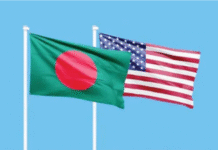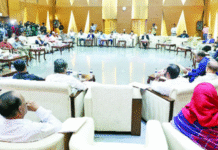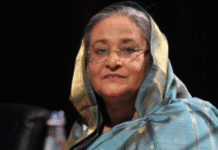
Journalists from Asian countries in a media conference in Dhaka on Friday laid emphasis on giving voice to the voiceless people through reporting from grounds while covering humanitarian crises and emergencies.
They observed that media and humanitarian workers need to play a ‘cohesive role’ during emergencies and highlighted that media should be the vehicle for change.
The journalists came up with the views on the first day of two-day ‘Asia Media Conference 2016’ at a city hotel.
International Committee of the Red Cross (ICRC) delegation in Bangladesh and Diplomatic Correspondents Association Bangladesh (DCAB) are hosting the two-day conference titled ‘Reporting Humanitarian Crises and Emergencies’.
Journalists from Afghanistan, India, Myanmar, Sri Lanka, Thailand, the Philippines, Indonesia, Japan, China, Australia, Nepal and Bangladesh are participating in the conference.
After the inaugural session, two working sessions – ‘The challenges to responsible and humanitarian journalism’ and ‘Threats and opportunities in the age of new media and innovation’ were held.
Australian journalist Brian John Thomson and Bdnews24.com’s Editor-in-Chief Toufique Imrose Khalidi presided the two sessions of the day respectively.
Brian said reporters need to hear the voices of victims and refugees rather reporting numbers. “It’s our duty to give voice to voiceless people.”
The Australian journalist said reporters also have a responsibility to tell positive stories as journalism is a vehicle for change.
Toufique Imrose said reporting on humanitarian crises has always been a challenge everywhere, not just here in Bangladesh, and laid emphasis on sharing experiences and learning from each other to overcome the challenges.
Bangladeshi journalist Anis Alamgir discussed how better reporters can report from war zones saying, “Apply your commonsense. Don’t glorify the war and your primary duty is to report on humanitarian issues.”
He identified financial support as one of the key factors for reporting from war zones successfully.
Another Bangladeshi journalist Humayun Kabir Bhuiya, talked about humanitarian consequences of migration that affecting Bangladesh.
“We’ve a responsibility to play a better role so that malpractices can be stopped,” he said describing the sufferings of people.
Kabir sought active role from the government to reduce migration cost and have better negotiations with the receiving countries.
Indonesian journalist Irwan Nugroho said media and humanitarian workers need to play a cohesive role in emergencies.
Nizamuddin Hamidi said media in Afghanistan is doing its best to reach people in need on the ground.
Indian journalist Hartosh Singh Bal said new technology of social media is being misused for propaganda and gains in individual agendas.
Indian journalist Jyoti Malhotra said, “We have to distinguish between the voice of government and voices of people.”
Source: Prothom Alo









